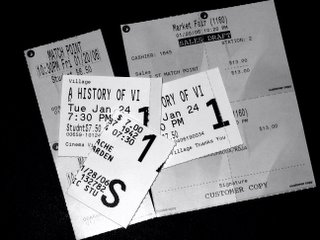Recently I saw three interesting movies. Not only I enjoyed all of them more or less but also I was happy to see new and exciting visual tricks, which changes narrating a classic story to a creative and enjoyable one. By this I don’t want to say classic stories are not enjoyable. Personally I like those but if one finds new ways to make story telling more interesting it is more exciting for me. So I recommend you to check them out if you have a chance.
Match Point directed by Woody Allen is a Romantic-Drama; it starts with a monologue voice-over in a tennis court: “there are moments in a match when the ball hits the top of the net and for a split second it can either go forward or fall back. With a little luck it goes forward and you win…or maybe it doesn’t, and you lose” and this is a story of the man who prefers to be lucky than to be good. If you see the movie then it would be interesting to remember the opening monolog and then when a marriage ring doesn’t go forward he has lost. Match Point is not a comedy but you can find parts of Woody Allen’s comedy in it, which makes a drama’s effect stronger.
A History of Violence directed by David Cronenberg is a Thriller. As I mentioned in my last post the story is based on a graphic novel. The classic destiny - your past will hunt you no matter how far you go - hand in hand with a hopeful lessen - the potential to be violent is in everyone also is the power to choose and be different - plus the creative mind of Cronenberg make this movie unforgettable. To break apart and rebuild the perfect family and their relationship seems very easy when Cronenberg does it.
Caché (Hidden) directed by Michael Haneke is a Psychological-Drama. I never expected to enjoy this movie mostly because of the French film stereotype (confusing plots, wondering actors, unresolved endings). In fact Caché does not intend to be enjoyable. The aim is to shock the audience and make them think about the film and have endless discussions about it. The film forces your memory to review every single shot. I also tried to remember scenes and dialogues. Then I asked myself why Georges is so passive? Doesn’t he have any feelings beside being panicked and cold? Why in this movie (society) no one cares about others or even about themselves? Algerian Majid vs. French Georges; are these characters symbols called back from history? And then what does the last scene mean? Is it continuity of Georges’ dream or is it reality? I think there is a credit to a film in which actors such as Daniel Auteuil and Juliette Binoche do such a good job to confuse you and in particular a credit to a director who lectures you by raising so many questions in your mind.
Match Point directed by Woody Allen is a Romantic-Drama; it starts with a monologue voice-over in a tennis court: “there are moments in a match when the ball hits the top of the net and for a split second it can either go forward or fall back. With a little luck it goes forward and you win…or maybe it doesn’t, and you lose” and this is a story of the man who prefers to be lucky than to be good. If you see the movie then it would be interesting to remember the opening monolog and then when a marriage ring doesn’t go forward he has lost. Match Point is not a comedy but you can find parts of Woody Allen’s comedy in it, which makes a drama’s effect stronger.
A History of Violence directed by David Cronenberg is a Thriller. As I mentioned in my last post the story is based on a graphic novel. The classic destiny - your past will hunt you no matter how far you go - hand in hand with a hopeful lessen - the potential to be violent is in everyone also is the power to choose and be different - plus the creative mind of Cronenberg make this movie unforgettable. To break apart and rebuild the perfect family and their relationship seems very easy when Cronenberg does it.
Caché (Hidden) directed by Michael Haneke is a Psychological-Drama. I never expected to enjoy this movie mostly because of the French film stereotype (confusing plots, wondering actors, unresolved endings). In fact Caché does not intend to be enjoyable. The aim is to shock the audience and make them think about the film and have endless discussions about it. The film forces your memory to review every single shot. I also tried to remember scenes and dialogues. Then I asked myself why Georges is so passive? Doesn’t he have any feelings beside being panicked and cold? Why in this movie (society) no one cares about others or even about themselves? Algerian Majid vs. French Georges; are these characters symbols called back from history? And then what does the last scene mean? Is it continuity of Georges’ dream or is it reality? I think there is a credit to a film in which actors such as Daniel Auteuil and Juliette Binoche do such a good job to confuse you and in particular a credit to a director who lectures you by raising so many questions in your mind.

No comments:
Post a Comment